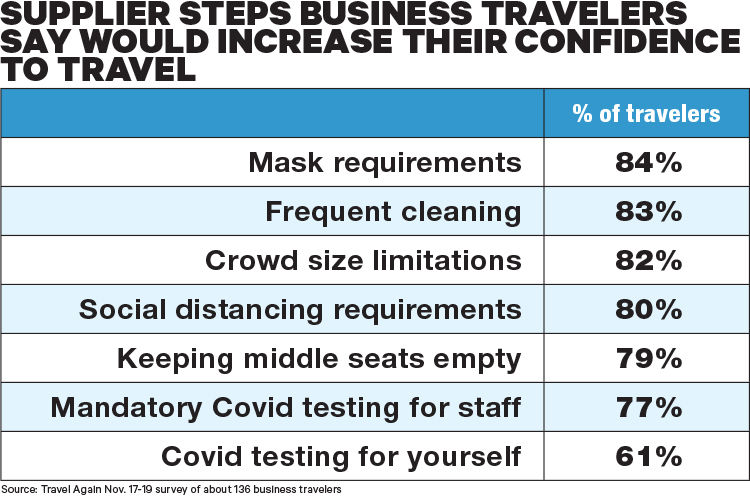Business travelers are becoming less comfortable with resuming travel, according to a new survey from industry advocacy group Travel Again, even as multiple potential Covid-19 vaccines have been publicly reported as apparently effective. Between Oct. 20 and Nov. 20, a period when new Covid-19 cases spiked in the U.S., the percentage of business travelers reporting they have made reservations for traveling on an airplane or staying at a hotel fell from 15 percent to 9 percent.
Travel Again from Nov. 17 to 19 surveyed 267 U.S.-based travelers, 51 percent of whom self-reported as business travelers.
[Report continues below chart.]

About 39 percent of respondents in November said they would travel domestically in the next 90 days if asked by their company, a drop from 53 percent in October. With regards to traveling internationally during that same timeframe, 25 percent in November reported they would, a fall from 31 percent in October.
When Travel Again asked business travelers to select among a menu of options that would increase their confidence in traveling again, mask requirements and frequent cleaning were the most frequently selected at 84 percent and 83 percent respectively. Travelers were not specifically asked if the vaccines had increased their confidence.
About 70 percent of business travelers said they would be willing to take multiple Covid-19 tests before and during travel and share their results to resume traveling without restrictions.
Business Travel Will Return, But Some Never Will
Even after the pandemic passes, there be permanent effects on the airline industry's business travel volume, according to a report by aviation revenue research firm IdeaWorksCompany and sponsored by CarTrawler, a mobility solutions provider.
The report is based on an analysis of industry, government and academic sources, predictions from travel industry experts and feedback from 15 industry executives.
IdeaWorksCompany estimates the airline industry permanently will lose 19 percent to 36 percent of their business travel volume due to workers becoming accustomed to using online conferencing technology as a replacement for business travel. At the moment, business travel is at 15 percent of its pre-pandemic level, according to IdeaWorksCompany, which expects that figure eventually to reach at least 64 percent.
The company estimates that business travel for sales and securing clients will stay relatively consistent with pre-pandemic levels, at 80 percent to 100 percent trip of pre-Covid trip volume, because "being there" remains an attribute for sales. The firm expects travel for intracompany meetings to see a 40 percent to 60 percent dive from pre-pandemic levels because in-person activity would be condensed to fewer events. IdeaWorksCompany also expects technology suppliers to create products, such as virtual reality goggles for meetings, to eliminate the need for trips for meetings.
A prime candidate for technology replacement are customer support trips, like trips made after the "sale is made," the volume of which the company projects will decline 20 percent to 30 percent from pre-pandemic levels, with trips for professional services for clients and research expected to drop 30 percent to 50 percent. Travel for conventions and trade shows could decline 10 percent to 20 percent, according to IdeaWorksCompany, due to the move to virtual events.
The company expected travel for technical equipment support will stay largely consistent with pre-pandemic levels, with the large majority of the projected 20 percent to 40 percent drop, attributed to non-in-person support. Travel by commuters by air could drop from 40 to 60 percent, according to the company.
As a share of business travel based on business trip purpose, sales and securing clients will form the largest share of airline traffic for the foreseeable future at 25 percent, according to the report. Intra-company meetings and conventions and trade shows each would comprise 20 percent. Professional services for clients and research, technical equipment support, and support of existing customers would each take up 10 percent of airline traffic. Commuting by air would make up 5 percent, according to IdeaWorksCompany.